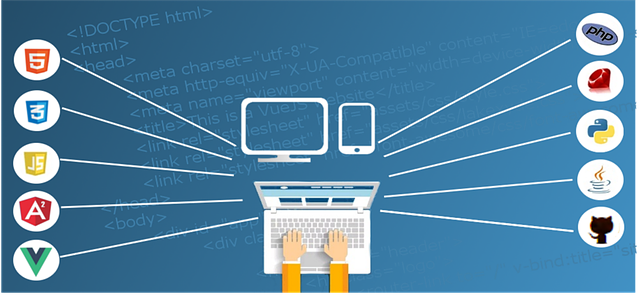Are you interested in an exciting technology career? Would you like a flexible job suited to a hybrid work environment, work from home, or work from anywhere?
If you understand computer technology and coding languages or have a desire to learn about them, working as a full stack developer might be for you. Let’s take a deep dive into what full stack developers do and what skills are required to be a full stack developer.
What Do Full Stack Developers Do?
Full stack developers create websites. They handle both frontend and backend tasks related to websites and software. This means that they can develop client software (front end tasks) and server software (back end tasks). They work with development teams in a leadership role.
Full stack developers are important because they understand all techniques needed for a project and the technologies involved. They can troubleshoot both the front and back end aspects. They can also liaise between different teams or team members.
What Skills are Required?
Generally, full stack developers should demonstrate knowledge of programming languages, project management skills, and web development. Logic and problem-solving abilities are also essential. Recruiters want to see examples of hands-on work. Likely, you will have worked in some other aspect of computer programming prior to applying as a full stack developer.
Full stack developers must have a deep understanding of computer programming languages. It takes more than just knowning HTML and CSS. Three essential skills are programming browsers, servers, and databases.
There are so many types of software one might use. Below, you’ll find some of the software and stacks you may need to know.
- Popular front end client software includes Angular, Backbone.js, Bootstrap, CSS, ES5, Ember.js, GraphQL, Grunt, Gulp, HTML, HTML DOM, JSON, JavaScript, Meteor.js, React, Redux, Storybook, W3.CSS, XML, and jQuery
- Popular back end server software includes ASP, C#, C++, Express.js, Firebase.com, GO, Java, Less, MongoDB, Node.js, PHP, PaaS (Azure and Heroku), Parse.com, Python, REST, Ruby, SQL, and Sass
You may also be expected to work with some of the most popular stacks, or combinations of front-end and back-end software. These include:
- The Django stack: JavaScript, Python, Django, and MySQL
- The LAMP stack: JavaScript, Linux, Apache, MySQL, and PHP
- The LEMP stack: JavaScript, Linux, Nginx, MySQL, and PHP
- The MEAN stack: JavaScript, MongoDB, Express, AngularJS, and Node.js
- The Ruby on Rails stack: JavaScript, Ruby, SQLite, and Rails
You’ll want to make sure you include the right skills on your resume. The job you’re looking for likely has preferred coding languages, browsers, servers, and databases. They also probably use an applicant tracking system (ATS), a computer program the checks your resume for the right keywords. Look for the keywords used in your job description, and use them in your resume.
How to Increase Your Full Stack Developer Skills
If you’re looking into a full stack developer career, you’ll first need to master the art of coding. Online resources like Codeacademy offer free coding courses. You might also consider seeking a Bachelor’s degree in computer science. This may not always be a requirement, but it is sure to give you a leg up in this competitive field.
If you already have computer science education, consider a coding certification. Online certification programs can be completed in less than a year. You can also continue your education by pursuing online “nanodegrees” – “a certified online educational programme that helps students develop specialised skills in areas related to Computer Science.”
You can use and hone your skills through on-the-job experience. You may be eligible for an entry-level computer programming or software development position prior to becoming a full stack developer.
Remember, when creating your full stack developer resume, it’s not enough to just have skills – you have to talk about them in the right way. When possible, use quantifiable terms to describe your experience. For example, don’t just say “Helped discover and fix computer bugs.” Instead, say, “Located and repaired more than 250 programming errors.” Instead of saying, “Created technical documentation,” say, “Streamlined technical documents to speed the design process by 15 percent.”
Finally, keep in mind that full stack developers must constantly learn new skills and stay abreast of changing technology. This means that you will need to research and use new programming techniques, development, and follow industry trends on a regular basis. Don’t forget to update your resume at least every six months to one year in order to reflect your newfound skills.

